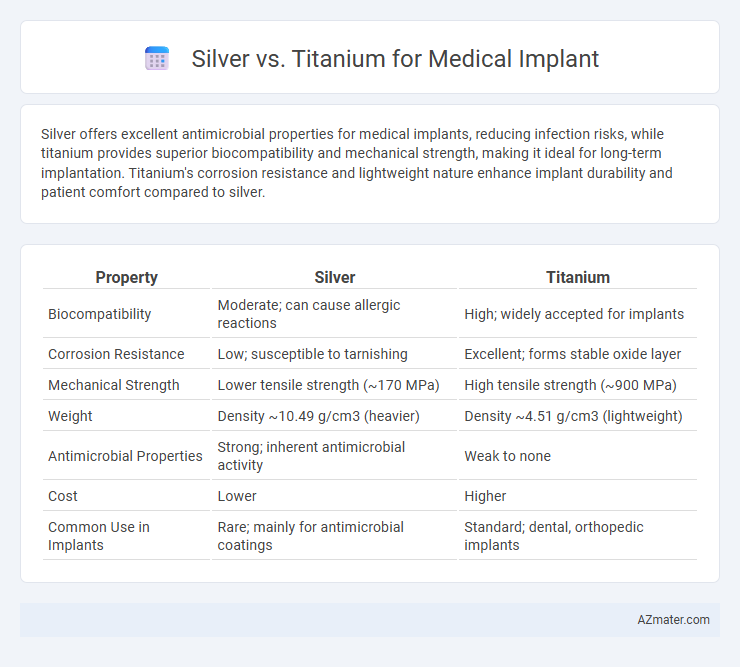Silver offers excellent antimicrobial properties for medical implants, reducing infection risks, while titanium provides superior biocompatibility and mechanical strength, making it ideal for long-term implantation. Titanium's corrosion resistance and lightweight nature enhance implant durability and patient comfort compared to silver.
Table of Comparison
| Property | Silver | Titanium |
|---|---|---|
| Biocompatibility | Moderate; can cause allergic reactions | High; widely accepted for implants |
| Corrosion Resistance | Low; susceptible to tarnishing | Excellent; forms stable oxide layer |
| Mechanical Strength | Lower tensile strength (~170 MPa) | High tensile strength (~900 MPa) |
| Weight | Density ~10.49 g/cm3 (heavier) | Density ~4.51 g/cm3 (lightweight) |
| Antimicrobial Properties | Strong; inherent antimicrobial activity | Weak to none |
| Cost | Lower | Higher |
| Common Use in Implants | Rare; mainly for antimicrobial coatings | Standard; dental, orthopedic implants |
Introduction: The Role of Materials in Medical Implants
Silver and titanium play crucial roles in medical implants due to their unique biocompatibility and functional properties. Titanium is widely used for its exceptional strength, corrosion resistance, and ability to integrate with bone through osseointegration. Silver, valued for its antimicrobial properties, is often incorporated to reduce infection risks, enhancing the longevity and safety of implants.
Biocompatibility: Silver vs Titanium in the Human Body
Titanium exhibits superior biocompatibility in medical implants due to its strong resistance to corrosion and ability to promote osseointegration without eliciting significant immune responses. Silver, while known for its antimicrobial properties, can release ions that may cause cytotoxicity and allergic reactions, limiting its use primarily to coatings rather than bulk implant material. Titanium's stable oxide layer ensures minimal inflammation and long-term implant integration, making it the preferred choice for load-bearing implants in the human body.
Corrosion Resistance and Longevity
Titanium exhibits superior corrosion resistance compared to silver, making it more suitable for long-term medical implants due to its stable oxide layer that prevents metal ion release and minimizes adverse tissue reactions. Silver, while possessing antimicrobial properties, is prone to corrosion and ion leaching, which can compromise implant integrity and trigger inflammation over time. The longevity of titanium implants is supported by extensive clinical data demonstrating their durability and biocompatibility in diverse physiological environments.
Mechanical Strength and Durability
Titanium is renowned for its exceptional mechanical strength and durability in medical implants, offering high tensile strength and resistance to fatigue, which ensures long-term functionality. Silver, while possessing antimicrobial properties, exhibits significantly lower mechanical strength and is prone to wear and corrosion, limiting its use as a structural implant material. The superior biocompatibility and corrosion resistance of titanium alloys make them the preferred choice for load-bearing and permanent medical implants.
Antimicrobial Properties of Silver and Titanium
Silver exhibits robust antimicrobial properties that effectively inhibit bacterial growth on medical implants, reducing the risk of infections. Titanium, while biocompatible and corrosion-resistant, lacks intrinsic antimicrobial characteristics, requiring surface modifications or coatings to enhance its infection prevention capabilities. The integration of silver coatings on titanium implants combines the mechanical strength and biocompatibility of titanium with silver's potent antimicrobial effects, optimizing implant performance and patient outcomes.
Osseointegration and Bone Compatibility
Titanium exhibits superior osseointegration due to its excellent biocompatibility and ability to form a stable titanium oxide layer that promotes bone cell attachment and growth, making it a preferred material for medical implants. Silver, while possessing strong antimicrobial properties, shows limited osseointegration and can induce cytotoxic effects that hinder bone compatibility. The balance between titanium's structural integration and silver's antimicrobial benefits is critical in optimizing implant performance and reducing infection risk.
Allergic Reactions and Toxicity Concerns
Titanium is widely preferred for medical implants due to its excellent biocompatibility, exhibiting minimal allergic reactions and low toxicity in the human body. Silver, while possessing antimicrobial properties, can cause allergic responses and potential cytotoxicity when used in implants, limiting its application in direct implantation. Studies highlight titanium's corrosion resistance and inert nature, making it safer for long-term implantation compared to silver, which may release ions that trigger adverse immune reactions.
Cost Comparison and Availability
Titanium implants are generally more expensive than silver due to the complex manufacturing processes and superior biocompatibility of titanium alloys. Silver, while more affordable and widely available as a raw material, is less commonly used alone in implants because of concerns about toxicity and mechanical strength. The high demand and established supply chain for titanium medical-grade materials ensure its consistent availability despite higher costs.
Common Applications in Medical Implants
Silver and titanium are both widely used materials in medical implants due to their unique properties and biocompatibility. Titanium is predominantly used for orthopedic implants, dental implants, and joint replacements thanks to its strength, corrosion resistance, and ability to integrate with bone through osseointegration. Silver is commonly applied in wound dressings, catheters, and coatings on implants for its potent antimicrobial properties, helping to reduce the risk of infection in medical devices.
Future Trends in Implant Material Technology
Silver and titanium remain leading materials in medical implants due to their biocompatibility and antimicrobial properties, with future trends emphasizing the integration of nanotechnology to enhance osseointegration and reduce infection risks. Advances in surface modification techniques, such as nanopatterning and bioactive coatings, aim to optimize cellular response and accelerate healing processes, positioning silver-titanium composites as promising candidates for next-generation implants. Emerging research focuses on smart implants equipped with sensors and drug delivery systems, leveraging these materials' durability and bio-functionality to improve patient outcomes and enable personalized medicine.

Infographic: Silver vs Titanium for Medical Implant
 azmater.com
azmater.com